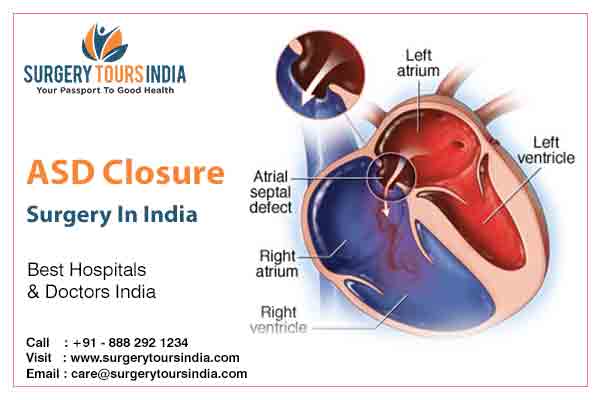
An atrial septal defect (ASD) is caused when the person's heart develops a hole in the wall that divides the atrial chambers (upper two chambers) of the heart. This results in the mixing of oxygenated and de-oxygenated blood that is likely to cause certain complications that affect the heart and lungs in the affected person.
A large ASD is also known to cause severe complications such as:
The treatment method and the device to be used to perform a successful and efficient atrial septal defect (ASD) is dependent on a number of factors that basically deal with the size of the hole as well as the general overall health of the patient.
Medications can be prescribed to relieve some of the discomforting signs and symptoms that arise due to atrial septal defect (ASD). Medications can also decrease the risk of other complications to arise after the surgery such as anticoagulants to prevent blood clot as well as beta blockers to prevent arrhythmia.
The treatment method to perform an ASD closure involves surgery and is usually suggested to be done as soon as the ASD is detected to prevent further complications from arising in the future. Surgical method of treating is used to treat medium to large sized atrial septal holes.
These are the two main types of surgical treatments that are recommended for ASD closure:
This surgery involves inserting a catheter (thin surgical tube) into the groin area and guiding it to the heart using imaging technology. This catheter is then used to block and close the hole in the atrial region of the heart using a plug or a mesh patch. The mesh acts as a support for tissue to grow around the hole and eventually seal it.
This method is efficient in repairing secundum atrial septal defects and may not be successful in repairing larger sized atrial septal defects.
This is a major form of surgery requiring the surgeon to administer general anesthesia and putting the patient on a heart-lung machine during the surgery period.
The surgeon makes an incision in the chest (sternum) area and invades the heart to seal the ASD hole with an artificial patch. Primum, sinus venosus and coronary sinus types of ASD are treated using an open-heart surgery method.
This treatment can also be performed using minimally invasive techniques that require smaller incisions to reach the heart and fix the patch to seal the hole in the atrial region of the heart.
The cardio-specialist doctors and cardiac surgeons in India are well known for their proficiency and experience in treating all types of major and severe cardiac complications and defects. These surgeons and doctors are supported by a well-trained medical staff that makes the surgery more successful. On top of that the wide network of cardiac-specialty hospitals and clinics in major cities of India are all equipped with the latest and most modern surgical instruments that ensures better efficiency by the doctors.
Surgery Tours India Medical Tourism Consultants have been the forerunners in managing treatment of Atrial Septal Defect (ASD) Closure cases since a long time. The efficient team of experts is well known for providing all possible and required support to the patient and their family on the tour for treatment in India. Surgery Tours India consultants are a team of experts who are well-experienced in handling simple as well as complex cases of Heart Surgeries including ASD Closure and have sent home thousands of foreign patients with successful treatment till date.
For more information please contact us at
Email: [email protected]
Phone: +91-888 292 1234 / +91-9730 001 540